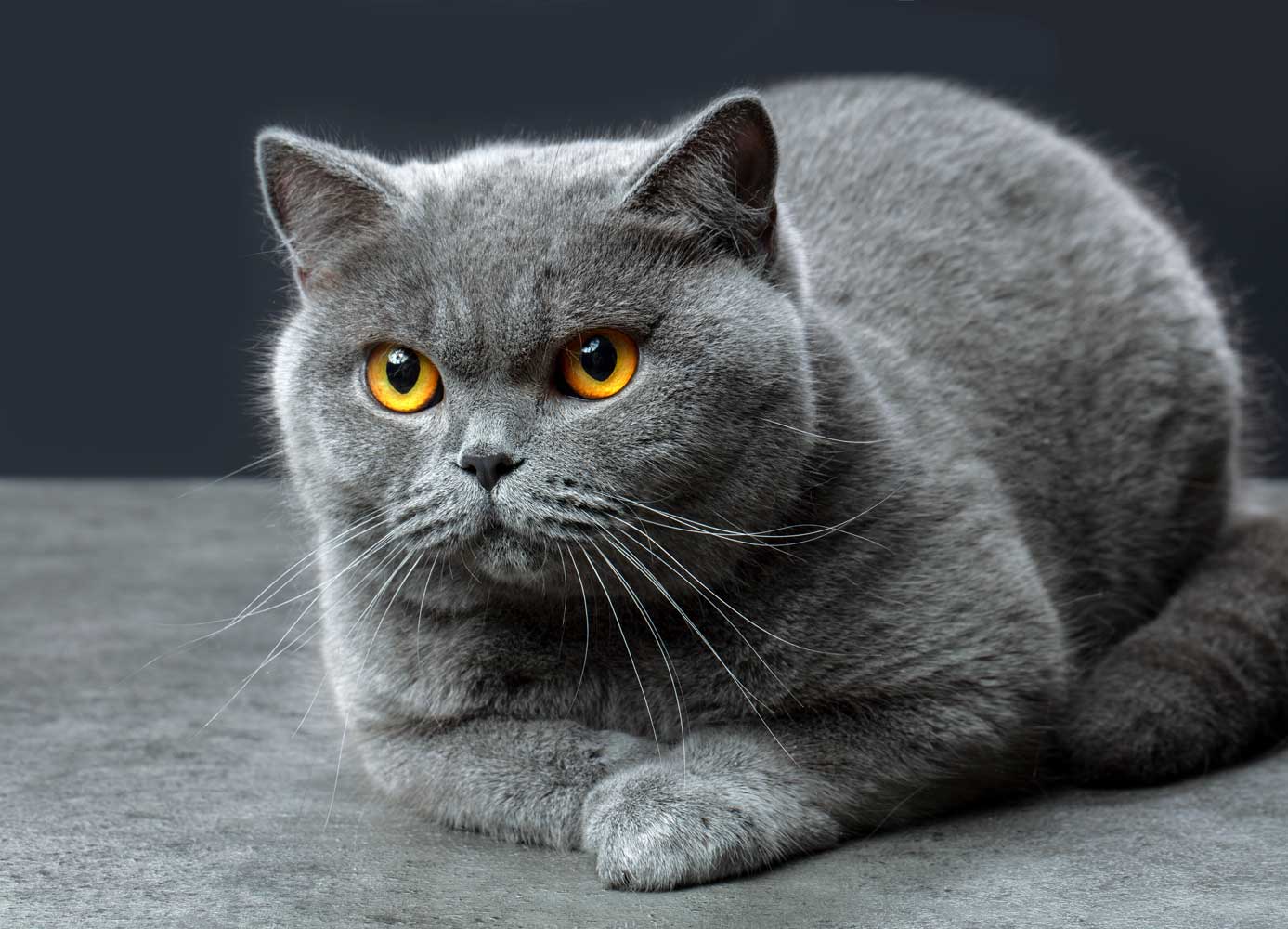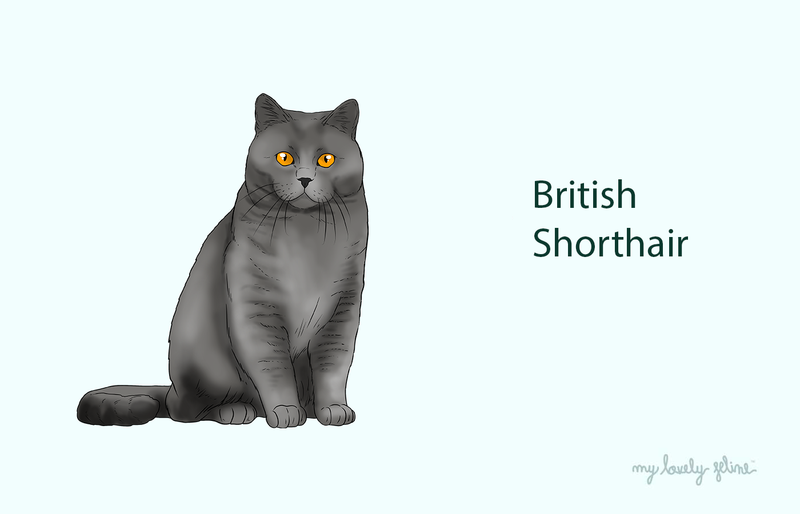|
Are you curious about British Shorthair cats? Look no further! In this comprehensive guide, we will delve into the history, unique characteristics, and everything else you need to know about these adorable feline companions. Whether you're considering getting a British Shorthair or simply want to learn more about them, this guide has got you covered. |
History of British Shorthair Cats
The history of British Shorthair cats dates back to ancient times. It is believed that these cats were brought to Britain by the Romans, where they quickly adapted to the local environment.
Over the centuries, they became popular as working cats on farms and ships, known for their strong and sturdy build. In the 19th century, British Shorthairs were crossbred with Persian cats to enhance their coat and appearance. Today, they are one of the most beloved and recognizable cat breeds in the world.

Physical Characteristics and Appearance
British Shorthair cats are known for their distinct physical characteristics and appearance. They have a medium to large build with a solid and muscular body. Their round face is adorned with large round eyes, which can come in various colors including copper, gold, and blue.
One of their most iconic features is their dense and plush coat, which comes in a wide range of colors and patterns. From classic blue and black to tabby, tortoiseshell, and even colorpoint variations, British Shorthairs are truly a sight to behold. Their adorable chubby cheeks and stocky legs add to their overall charm and appeal.
Personality Traits and Temperament
British Shorthair cats are known for their calm and easygoing temperament. They are generally independent and do not require constant attention or stimulation. They are content to spend their time lounging around and observing their surroundings.
However, they are also known to be affectionate and enjoy the company of their owners. They are not overly demanding and are often described as being low-maintenance pets. British Shorthairs are typically good with children and other pets, making them a great choice for families.
They are not known to be particularly vocal and are generally quiet and reserved. Overall, British Shorthair cats have a gentle and friendly nature, making them a beloved breed among cat lovers.
Health and Care Tips for British Shorthair Cats
Taking care of your British Shorthair cat's health is essential to ensure they live a long and happy life. Here are some health and care tips to keep in mind:
1. Regular Vet Check-ups: Schedule regular visits to the vet for vaccinations, check-ups, and preventive care. This will help catch any potential health issues early on.
2. Balanced Diet: Feed your British Shorthair a balanced and nutritious diet that is appropriate for their age and activity level. Consult with your vet to determine the best food options for your cat.
3. Grooming: British Shorthairs have a dense and plush coat that requires regular grooming. Brush their fur at least once a week to prevent matting and remove loose hair.
4. Dental Care: Dental hygiene is important for your cat's overall health. Brush their teeth regularly and provide dental treats or toys to help keep their teeth clean.
5. Exercise: While British Shorthairs are generally not as active as some other breeds, they still need regular exercise to maintain a healthy weight and prevent obesity. Engage them in playtime and provide toys to keep them active.
6. Litter Box Maintenance: Keep the litter box clean and provide a comfortable and easily accessible area for your cat to do their business.
7. Environmental Enrichment: Provide your British Shorthair with toys, scratching posts, and climbing structures to keep them mentally stimulated and prevent boredom.
8. Hydration: Ensure your cat has access to fresh water at all times to prevent dehydration.
9. Parasite Prevention: Use flea and tick prevention products recommended by your vet to protect your cat from external parasites.
10. Spaying or Neutering: Consider spaying or neutering your British Shorthair to prevent unwanted litters and potential health issues.
By following these health and care tips, you can ensure that your British Shorthair cat remains happy, healthy, and well-cared for.
Training and Socialization of British Shorthair Cats
Training and socialization are important aspects of raising a British Shorthair cat. While they may not be as trainable as some other breeds, it is still beneficial to teach them basic commands and provide them with socialization opportunities. Here are some tips for training and socializing your British Shorthair:
1. Start Early: Begin training and socializing your British Shorthair kitten as early as possible. This will help them become accustomed to new experiences and develop good behavior habits.
2. Positive Reinforcement: Use positive reinforcement techniques, such as treats and praise, to reward your cat for desired behaviors. This will encourage them to repeat those behaviors in the future.
3. Basic Commands: Teach your British Shorthair basic commands like "sit," "stay," and "come." Keep training sessions short and fun to maintain their interest.
4. Litter Box Training: Ensure that your cat is properly litter box trained. Provide a clean and easily accessible litter box and reward them when they use it correctly.
5. Socialization: Expose your British Shorthair to different people, animals, and environments to help them become comfortable and confident in various situations. This can include inviting friends over, taking them for supervised outings, or introducing them to other pets gradually.
6. Playtime: Engage in interactive play sessions with your British Shorthair to keep them mentally stimulated and provide an outlet for their energy. Use toys that encourage exercise and mimic natural hunting behaviors.
7. Patience and Consistency: Training and socialization take time and patience. Be consistent with your expectations and reinforce positive behaviors consistently.
Conclusion
Remember, every cat is unique, and some British Shorthairs may be more independent or less interested in training than others. It's important to respect their individual personalities and work with them at their own pace. With patience and positive reinforcement, you can help your British Shorthair become a well-rounded and well-behaved companion.
British Shorthair Cat FAQ
What is a British Shorthair cat?
A British Shorthair cat is a breed of domestic cat known for its round face, sturdy body, and dense, plush coat. They are one of the oldest and most well-known cat breeds originating from the United Kingdom.
How big do British Shorthair cats get?
British Shorthair cats are medium to large-sized cats. Adult males typically weigh between 12-18 pounds (5.4-8.2 kg), while adult females generally weigh between 8-14 pounds (3.6-6.4 kg).
What is the personality of a British Shorthair cat like?
British Shorthair cats are typically calm, reserved, and easygoing. They are known for their independent nature and tend to be less demanding of attention compared to some other breeds. They are generally gentle, affectionate, and enjoy a peaceful environment.
Are British Shorthair cats good with children?
British Shorthair cats are generally tolerant and patient with children. They have a calm demeanor and can get along well with respectful and gentle children. However, proper supervision and teaching children how to interact appropriately with cats are important.
Are British Shorthair cats good for apartments?
British Shorthair cats can adapt well to apartment living. They are not overly active and can be content with indoor environments. However, providing them with enough space, scratching posts, and toys for mental stimulation is important.
Do British Shorthair cats require a lot of grooming?
British Shorthair cats have a dense and plush coat that requires regular grooming to prevent matting and keep it in good condition. Weekly brushing is usually sufficient to remove loose hairs and maintain their coat's health.
Are British Shorthair cats prone to any specific health issues?
British Shorthair cats are generally a healthy breed with no specific breed-related health issues. However, as with any cat, they can be susceptible to common feline health problems such as obesity, dental issues, and certain genetic conditions. Regular veterinary check-ups are important to monitor their health.
Do British Shorthair cats get along well with other pets?
British Shorthair cats can generally get along well with other pets when properly introduced and socialized. They have a calm and non-confrontational nature, which can facilitate positive relationships with other cats or dogs in the household.
Are British Shorthair cats vocal?
British Shorthair cats are known for their quiet and non-vocal nature. They are generally not excessively vocal and tend to communicate through subtle sounds like purring or gentle meows.
How long do British Shorthair cats live?
British Shorthair cats have a relatively long lifespan, averaging between 12-17 years. With proper care, nutrition, and regular veterinary check-ups, some British Shorthairs can live even longer.
Do British Shorthair cats require a lot of exercise?
British Shorthair cats are not overly active and do not require intense exercise. They enjoy short play sessions and gentle activities, but they are generally content with a moderate level of physical activity.
Are British Shorthair cats indoor or outdoor cats?
British Shorthair cats are generally better suited for indoor living. Their dense coat makes them less tolerant of extreme weather conditions, and keeping them indoors helps protect them from potential dangers such as traffic, predators, or infectious diseases.
Are British Shorthair cats prone to excessive shedding?
British Shorthair cats have a dense coat that sheds moderately. Regular brushing can help manage shedding and keep their coat healthy. However, they are not considered heavy shedders compared to some other breeds.
Are British Shorthair cats affectionate?
British Shorthair cats can be affectionate, but they often express it in a more independent and reserved manner. They enjoy companionship and may seek attention on their terms, preferring quiet and peaceful interactions.
Are British Shorthair cats good for first-time cat owners?
British Shorthair cats can be a good choice for first-time cat owners. Their calm and independent nature, along with their low-maintenance grooming requirements, make them relatively easy to care for. However, it is important for first-time owners to understand their needs and provide proper care and attention.




